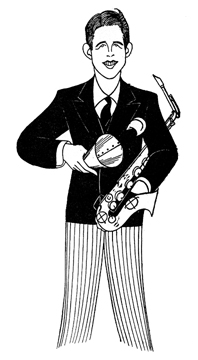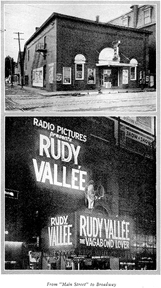Here are 10 things you should know about Grant Mitchell, born 149 years ago today. He abandoned his law career for a life on the stage and later became a very busy character actor in pictures.
Tag: Yale
Times Square Tintypes: Rudy Vallee
In this chapter from his 1932 book, Times Square Tintypes, Broadway columnist Sidney Skolsky profiles crooner and bandleader Rudy Vallee.
AMERICA’S SWEETHEART
RUDY VALLEE was born July 28, 1901, in Island Pond, Vt.
 His real name is Herbert Prior Vallee. Took the name of Rudy from Rudy Wiedoft, the saxophone player. His idol.
His real name is Herbert Prior Vallee. Took the name of Rudy from Rudy Wiedoft, the saxophone player. His idol.Curses like a stoker. Has a temper and when it is aroused he screams like a woman.
His father was a pharmacist and owned a drug store in Westbrook, Maine, until last summer. The father is a French Canadian. His mother is Irish. Has one sister, Kathleen Marie, and one brother, William, who goes to Fordham College and lives with him.
Doesn’t drink much. When he does he takes a rye highball. The taste of Scotch makes him sick.
When the war broke out he ran away from home to enlist in the navy. While in a training school, they learned that he was only fifteen years old. He was put in the hoosegow until his parents called for him. Stills thinks he was a sailor.
His boyhood ambition was to be a letter carrier.
Sleeps in gay-colored pajamas. He snores and grinds his teeth. Occasionally he has a hot-water bag in bed with him to keep his toes warm. Gets semi-nightmares and wanders in his sleep. Several times his brother pulled him back from walking out a window.
Can play only two instruments. The saxophone and the clarinet. He two-fingers the piano a bit. He is left-handed.
As a kid and a student at Yale he was unpopular with the girls. While at college he majored in Spanish. His desire then was to be a wealthy South American business man.
He pinches the lobe of his ear with his finger nails when he is nervous.
Smokes occasionally. It is an English brand of cigarettes. He has posed for pictures smoking a pipe but detests one. Often requests people not to smoke a pipe in his presence.
The kind of a woman who appeals to him the most is one of the Lenore Ulric type of beauty.
Can often be seen in Childs’ or in Thompson’s one-armed lunch place. His favorite dish is buckwheat cakes with plenty of butter.
While playing at the Rendezvous, he sang so low that Gilda Gray told him “to go get a megaphone.” He did. Now plans to use an all glass megaphone so people will be able to see his face when singing.
His blond eyebrows are not very prominent. Therefore for photographs and stage purposes he pencils in arched eyebrows.
Keeps all strings, bags and papers that he finds. His pockets are filled with bits of paper, cigarette crumbs, throat tablets and burnt matches. Buys every patent medicine that appears. He always carries at least three toothbrushes.
Whenever he takes a girl out to eat he tells her what to order.
Lets his clothes flop wherever he takes them off. Never bothers to hang them up. Is economical. Takes stains out of his suits with a home cleaning fluid.
While playing at the Paramount, two schoolgirls, watching him, decided that they had to meet him personally. Posing as interviewers from a high school paper, they were ushered into his dressing room. As a matter of courtesy, he offered his hand in greeting. One of the girls took it and fainted. The other fell back in a chair—exhausted. The house physician was called, and the girl was revived and escorted to the street. But not until the one who clasped Rudy’s hand let it be known that she was never going to wash the hand that touched her hero’s hand.
His great ambition today is to make one million dollars.
When reading he prefers Western stories. Believes the greatest book ever written to be The Guarded Heights, a story of college life at Princeton, by Wadsworth Camp.
Of all the songs he sings his favorite is “Deep Night.”
On May 11, 1928, he married Leonie Cauchois McCoy. The marriage was annulled the August of that year. He gives every girl the “Grey Dawn” test. Keeps them out until dawn, believing that if a girl looks good then she’ll look good any time.
Has two scars on his body. One is from an appendicitis operation. The other is a bit of gravel in his left knee cap. The result of a motor-cycle accident.
The one thing in life he fears is that some day he will be fat and bald.
Fridays with Rudy: Vagabond Dreams Come True, Ch. 15
In Chapter 15 of his 1930 memoir, Vagabond Dreams Come True, Rudy Vallée pays homage to the man who served as his saxophone mentor and muse, Rudy Wiedoeft.
THE SAX GOD—WIEDOEFT
Probably most people connect my name with the saxophone, but only a few know that all my life I have had a great desire to play some sort of a musical instrument. I went from drums to clarinet, to trumpet, to saxophone.
The clarinet I studied faithfully for ten weeks and then was forced to neglect it, due to a very hard job in a sawmill during the summer vacation. When I think of how close I came to losing my fingers I thank my lucky stars that I finished that summer’s work without receiving so much as a scratch from a saw. Many times when I worked on the “edger,” the saw teeth striking a knot in the board would throw it back so that the palm of my hand just missed the teeth.
 I took up the study of the trumpet while working back stage with a stock company, and then rented a saxophone when I began my senior year in school. The similarity between saxophone and clarinet made it possible for me to play a limited range of notes on the saxophone. The horn that I had was called a C Melody, being pitched in C. I could read song sheets, the violin parts, without any transposition. I used to play at night with several acquaintances who gathered in a bowling alley where near beer was served, and go canoeing with a banjo player or a violinist. Always I played for my own amusement and for those who cared to listen. Finally I was engaged by a small dance orchestra playing two nights a week in a Pythian Temple Building. This led to more engagements in northern Maine with what had been Maine’s most famous dance orchestra, Welch’s Novelty Orchestra.
I took up the study of the trumpet while working back stage with a stock company, and then rented a saxophone when I began my senior year in school. The similarity between saxophone and clarinet made it possible for me to play a limited range of notes on the saxophone. The horn that I had was called a C Melody, being pitched in C. I could read song sheets, the violin parts, without any transposition. I used to play at night with several acquaintances who gathered in a bowling alley where near beer was served, and go canoeing with a banjo player or a violinist. Always I played for my own amusement and for those who cared to listen. Finally I was engaged by a small dance orchestra playing two nights a week in a Pythian Temple Building. This led to more engagements in northern Maine with what had been Maine’s most famous dance orchestra, Welch’s Novelty Orchestra.By that time I had begun to think I was quite a saxophonist; the boys in that band, and in fact every band I played with, made so much of me that I was very pleased with my progress.
I had read somewhere, possibly in a Victor catalogue, about a Victor record that Joseph C. Smith and his orchestra had played called “Caravan.” This was the composition of a young man, a saxophonist by the name of Rudy Wiedoeft, who, the article said, dropped in when Smith was recording the number and played a chorus of variations which were truly marvelous. Just before I had left for the summer engagement in northern Maine I had listened to a record that this young man had made with another saxophonist and two pianos (these four called themselves the Wiedoeft-Wadsworth Quartet). On this record, called “The Crocodile,” the saxophones had employed a peculiar form of tongueing known as “slap tongue” because it gives forth from the bell a sound very much akin to that produced by two boards being slapped together. I noticed that this always intrigued the layman even as it did me. After experimenting a little bit with the mouthpiece and reed, I stumbled onto this effect, and it stood me in great stead in those early days, and brought a lot of attention to my playing, as many saxophonists are to able to do it.
Then in the fall when I returned from the summer engagement, the Victor Company released the first solo played by Rudy Wiedoeft on the same type of instrument that I used, the C Melody. Both numbers were his own compositions and one of them is his pièce de résistance, that one that he is always associated with, namely “Saxophobia.” They are masterpieces even today, and I truthfully believe no one could record them in quite the way Wiedoeft did. Although Wiedoeft’s beautiful tone was apparent in “The Crocodile” it remained for this wonderful record of “Valse Erica” and “Saxophobia” to show me the great possibilities of the saxophone as a concert solo instrument.
I wrote Wiedoeft, asking him a few technical questions. The weeks dragged by but no reply came, so I wrote a second, and a third, and a fourth, and so on until I had written eight letters. I made up my mind that if persistence counted for anything. I would hear from him, but I did not realize that I was writing to perhaps the busiest man in New York City. Between phonograph records, solo appearances, and a thousand and one pressing engagements, Rudy Wiedoeft had no time for answering fan mail. Then again, Rudy Wiedoeft had no time for answering fan mail. Then again, Rudy dislikes letter writing, not being of a particularly literary turn of mind. I did not hear from him until I came down with acute appendicitis in December, 1920. This time, noting that I was sick and in the hospital, he answered my letter, replying to my questions in full.
I had begun the study of the saxophone with a man who had had many years’ experience with the instrument. This man decried the use of “slap tongue” as being “illegitimate,” and perhaps it was pity for my helplessness in the hospital combined with irritation at the criticism of “slap tongue” by this instructor that made Wiedoeft reply. Anyway, he censured my instructor roundly for daring to criticize him, inviting him to come to New York City where, as he said, the phonograph business was open, and any one of the phonograph companies would welcome him with open arms if he were as good a saxophonist as he was a critic. Wiedoeft’s final point impressed me very strongly. He said that anything is legitimate so long as it produces the goods. I never quite forgot that statement, and although it is not actually or completely true, it comes pretty near being.
